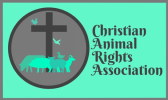
Early Christian Figures Recognized ‘The New Covenant’
The new covenant (Luke 22:20), which began shortly after Pentecost (Acts 2:1), is most likely why many early Christian figures abstained from consuming meat. None of the following information is meant to be authoritative or inspired, as it is not from the Bible (2 Tim 3:16–17; 2 Pet 1:19–21). However, these early documents lend support to the fact that a component of the new covenant (Luke 22:20) encourages abstinence from harming animals (specifically through diet).
